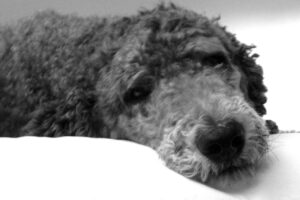 Willie follows me everywhere. A pandemic puppy, he has not yet endured much alone time. He quickly learned our two code phrases (“Going shopping” signals a fairly short, bearable absence; “Going to work” means it could be a while), and if he is trotting along beside me and hears either “shopping” or “work,” he makes an instant U-turn and goes upstairs to weep. Or whatever the canine equivalent is.
Willie follows me everywhere. A pandemic puppy, he has not yet endured much alone time. He quickly learned our two code phrases (“Going shopping” signals a fairly short, bearable absence; “Going to work” means it could be a while), and if he is trotting along beside me and hears either “shopping” or “work,” he makes an instant U-turn and goes upstairs to weep. Or whatever the canine equivalent is.
“Why use the words?” a friend asks. “Why not just leave?”
At first, this seems a sensible correction. Willie will have a few minutes less time to be sad, there will be no particular words to dread, and the leavetaking might seem breezier, no big deal. Why are we trying to play Dr. Doolittle with him?
Wait, though. Dr. Doolittle would not teach phrases. He would speak Willie’s clear and simple language, and I cannot ignore it either. When I get to the door, he is right there, looking up at me expectantly. Walk? Park? Romp in the yard? I cannot close the door behind me, wordless, leaving him on the other side as I vanish without explanation.
“Going shopping,” I say gently. Our standard poodle melts into a basset hound and slinks away, not even staying for goodbye. Still, it feels like less of a betrayal, more honest. Hard as it is to see those sad eyes, at least he has a chance to express disapproval. Which I address by leaving apologetic treats on his mat.
The treats, too, you could question. Why try to sweeten inevitable partings? Especially since every dog we have ever had (all standard poodles and smarter than we are) has refused to eat the bribe until we come home. Still, it is an acknowledgment.
When a plane sits on the tarmac an extra two hours waiting for some defective part and the flight attendants open the bar, I am always delighted. Not because I would have said, “Oh, please put me on a flight that will be interminably delayed so I can have a free whiskey and ginger ale,” but because it is an honest acknowledgment that they have inconvenienced us. We are now a community, all delayed together, not an assemblage of individuals stewing in various degrees of frustration and all angry at the invisible pilot behind the door who has been careless enough to allow this to happen and is now refusing to admit it.
When United Healthcare offers me $75 to have that dreaded annual physical, I go gladly—not because I am craven (though I am) but because they are acknowledging my dread and sweetening the deal. This has ceased to be some abstract, faceless obligation to a company that uses a computerized system to jog my memory and cooperation. Instead, it is a thank you, acknowledging that by taking the time to do this I am saving them considerably more than $75 in future health bills. We are in this together.
Willie is part of our family, and we are in this together. The same could once have been said of this country. But too many politicians have lied, danced around the truth, snuck off someplace without telling us, or pretended we were not touched by what had occurred.
Tell us the worst truths, about illness or our environment, money or foreign threats. Admit that it is hard, acknowledge that we are affected by this outcome over which we are powerless. Let us know what we can do to avoid or improve the outcome, and if there is nothing we can do, include us anyway, because we are the ones who are about to suffer.
Ah, that would be disastrous, the power-brokers say. People must not be told the full truth. They must not be informed of danger or disease, mistakes or past wrongs; they will only get upset and lose confidence in us.
If that is so, we are less than poodles.
Read more by Jeannette Cooperman here.
